- 1Unet实现眼底图像血管分割(二)_n_subimgs是什么意思
- 2Linux离线安装JDK1.8_linux 离线安装jdk1.8
- 3DNN深度神经网络模型做多输入单输出的拟合预测建模_dnn网络预测 多输入单输出
- 4自练题目c++
- 5demonstration记忆_新手学习雅思的基础, 雅思单词记忆技巧法
- 6BP神经网络实例及代码分析(python+tensorflow实现)_bp神经网络python代码tensorflow
- 7Java中获取Exception的详细信息_java获取exception的错误信息
- 8机器学习——卷积基础
- 9自然语言处理(NLP)实验——语言模型应用_自然语言处理实训
- 10数据库系列之OceanBase架构及安装部署_oceanbase部署
Ubuntu20.04下vins-mono用自己数据并跑通(手机摄像头/离线)_ubuntu20.04 跑vins-mono
赞
踩
目录
问题:/usr/bin/env: “python\r”: 没有那个文件或目录
问题:kalibr_calibrate_cameras:未找到命令
问题:Invoking "make -j1 -l1" failed
问题:在可视化界面,有影像但是没有轨迹(废弃,手机导致的问题)
今天也在痛苦面具中
系统:Ubuntu 20.04
ros:noetic
相机:华为手机摄像头
大概看了一下, 大多数用手机摄像头还是跑的离线,比直接调用usb麻烦。
一、数据采集
找了一圈,基本都是通过app来获得所需数据,这里感谢一下github上的大佬。
1、安装采集app
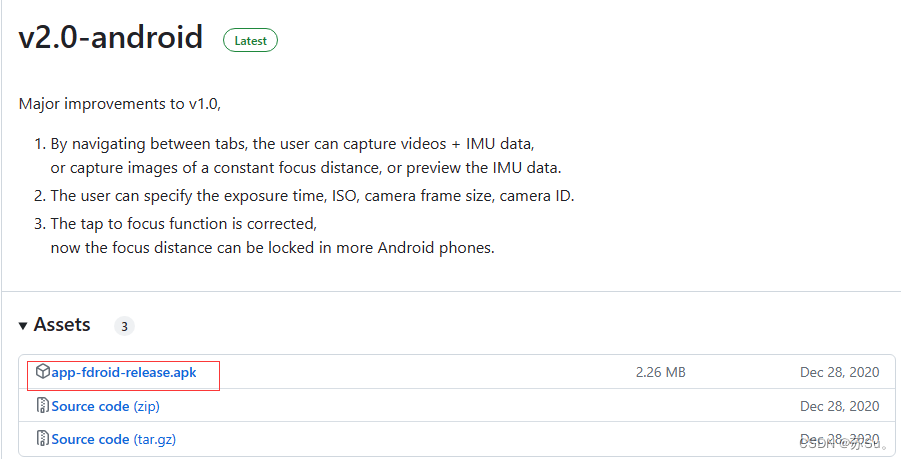
在手机上安装v2.0版本
2、录制
安装完成后打开,第一眼就是imu页面
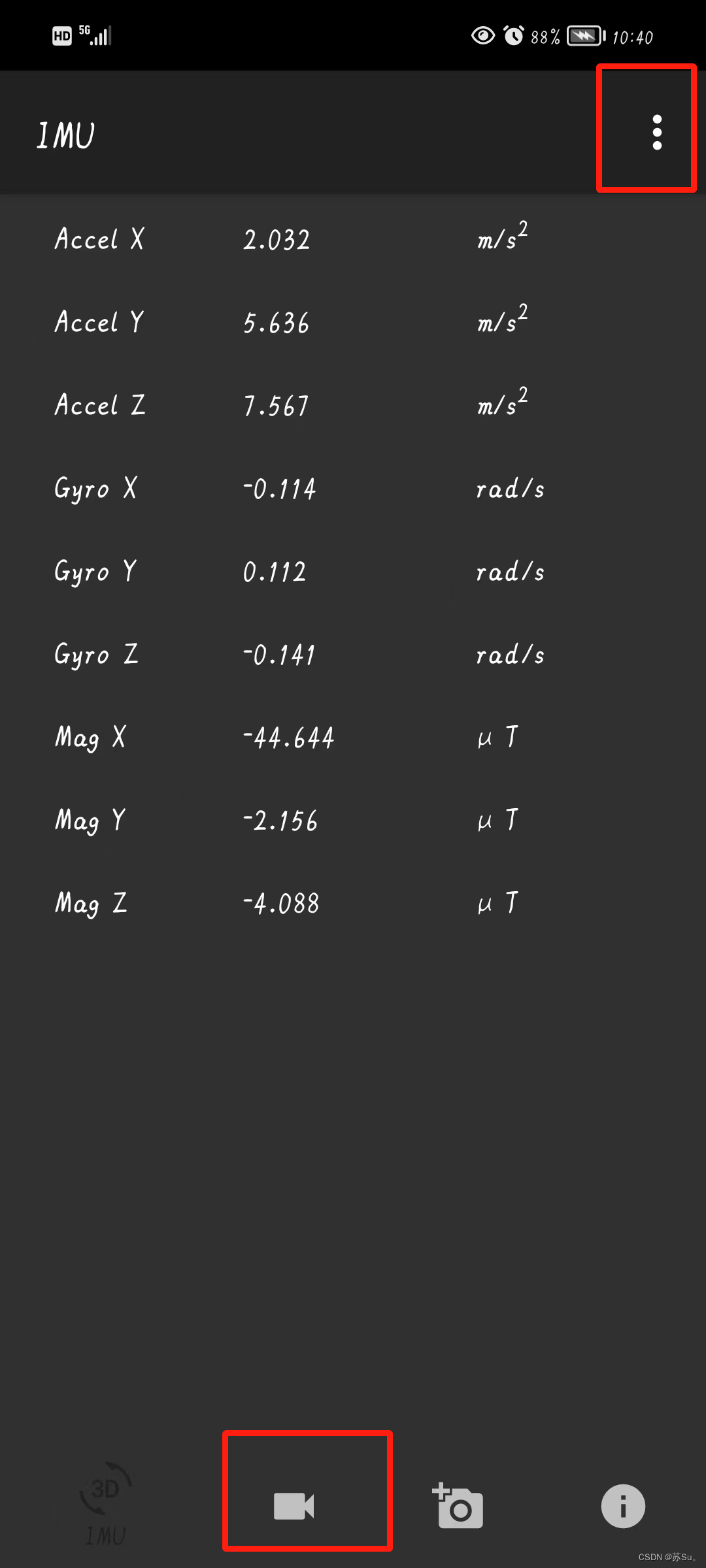
上面的三个点是设置,可以调分辨率(建议640*480)

下面的摄像图案就是录制页面,点进去以后上面record是录制,录制开始后变成stop结束,第二个框是设置的分辨率,第三个框是录制好的数据文件名
录制启动的时候,原地转几圈,这样初始化的结果会准一点,直接前进的话可能没有轨迹
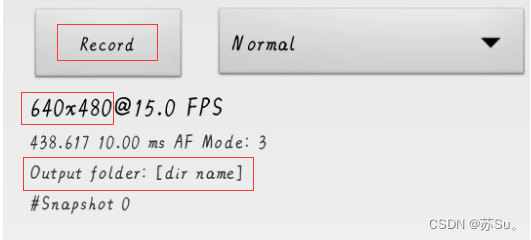
录制完成后把数据从手机转存到电脑上
![]()
问题:找不到录制数据在哪里
我数据存的地方是 Android/data/edu.osu.pcv.marslogger/files/data
或者连接电脑后,直接在文件下面按照上面文件命名的格式搜
如果搜不到,可以尝试开启 开发者模式-USB调试 后寻找
文件内包含内容如下:

movie.mp4是视频流信息
gyro_accel.csv是imu的含有时间戳、加速度计和陀螺仪的数据
frame_timestamp.txt是视频帧时间戳数据
二、数据打包
打包有两种方法,一种是在ros下录制打包,另一种是通过脚本打包,这里选择第二种
1、准备打包文件
1)kalibr_bagcreater.py
打包脚本 源码
- #!/usr/bin/env python
-
- from __future__ import print_function
- import os
- import sys
- import argparse
- import math
- import re
-
- import rosbag
- import rospy
- from sensor_msgs.msg import Image
- from sensor_msgs.msg import Imu
-
- import cv2
-
- import utility_functions
-
- # case 1 create a rosbag from a folder as specified by the kalibr format
- # https://github.com/ethz-asl/kalibr/wiki/bag-format
- # structure
- # dataset/cam0/TIMESTAMP.png
- # dataset/camN/TIMESTAMP.png
- # dataset/imu.csv
-
- # case 2-4 create a rosbag from a video, a IMU file, and a video time file
- # The video time file has the timestamp for every video frame per IMU clock.
- # The saved bag will use the IMU clock to timestamp IMU and image messages.
-
-
- def parse_args():
- parser = argparse.ArgumentParser(
- description='create a ROS bag containing image and imu topics '
- 'from either image sequences or a video and inertial data.')
- # case 1 arguments used by the kalibr to create a rosbag from a folder
- parser.add_argument(
- '--folder',
- metavar='folder',
- nargs='?',
- help='Data folder whose content is structured as '
- 'specified at\nhttps://github.com/ethz-asl/kalibr/wiki/bag-format')
- parser.add_argument('--output_bag',
- default="output.bag",
- help='ROS bag file %(default)s')
-
- # case 2 arguments to create a rosbag from a video, a IMU file,
- # and a video time file
- parser.add_argument('--video',
- metavar='video_file',
- nargs='?',
- help='Video filename')
- parser.add_argument(
- '--imu',
- metavar='imu_file',
- nargs='+',
- help='Imu filename. If only one imu file is provided, '
- 'then except for the optional header, '
- 'each line format\n'
- 'time[sec or nanosec], gx[rad/s], gy[rad/s], gz[rad/s],'
- ' ax[m/s^2], ay[m/s^2], az[m/s^2]. '
- 'If gyro file and accelerometer file is provided,'
- 'Each row should be: time[sec or nanosec],x,y,z'
- ' then accelerometer data will be interpolated'
- ' for gyro timestamps.')
- parser.add_argument('--first_frame_imu_time',
- type=float,
- default=0.0,
- help='The time of the first video frame based on the'
- ' Imu clock. It is used together with frame rate'
- ' to estimate frame timestamps if the video time'
- ' file is not provided. (default: %(default)s)',
- required=False)
- parser.add_argument('--video_file_time_offset',
- type=float,
- default=0.0,
- help='When the time file for the video is provided, '
- 'the video_file_time_offset may be added to '
- 'these timestamps.(default: %(default)s)',
- required=False)
- parser.add_argument('--video_from_to',
- type=float,
- nargs=2,
- help='Use the video frames starting from up to this'
- ' time [s] relative to the video beginning.')
- parser.add_argument('--video_time_file',
- default='',
- nargs='?',
- help='The csv file containing timestamps of every '
- 'video frames in IMU clock(default: %(default)s).'
- ' Except for the header, each row has the '
- 'timestamp in nanosec as its first component',
- required=False)
- parser.add_argument(
- '--downscalefactor',
- type=int,
- default=1,
- help='A video frame will be downsampled by this factor. If the resultant bag is '
- 'used for photogrammetry, the original focal_length and '
- 'principal_point should be half-sized, but the '
- 'distortion parameters should not be changed. (default: %(default)s)',
- required=False)
- parser.add_argument(
- "--shift_secs",
- type=float,
- default=0,
- help="shift all the measurement timestamps by this amount "
- "to avoid ros time starting from 0."
- "Only for case 4, see help.")
-
- if len(sys.argv) < 2:
- msg = 'Example usage 1: {} --folder kalibr/format/dataset ' \
- '--output_bag awsome.bag\n'.format(sys.argv[0])
-
- msg += 'Example usage 1.1: {} --folder tango/android/export/ ' \
- '--imu gyro_accel.csv ' \
- '--output_bag awsome.bag\n'.format(sys.argv[0])
-
- msg += "dataset or export has at least one subfolder cam0 which " \
- "contains nanosecond named images"
-
- msg += 'Example usage 2: {} --video marslogger/ios/dataset/' \
- 'IMG_2805.MOV --imu marslogger/ios/dataset/gyro_accel.csv ' \
- '--video_time_file marslogger/ios/dataset/movie_metadata.csv ' \
- '--output_bag marslogger/ios/dataset/IMG_2805.bag\n'. \
- format(sys.argv[0])
-
- msg += 'Example usage 3: {} --video marslogger/android/dataset/' \
- 'IMG_2805.MOV --imu marslogger/android/dataset/gyro_accel.csv' \
- ' --video_time_file ' \
- 'marslogger/android/dataset/frame_timestamps.txt ' \
- '--output_bag marslogger/android/dataset/IMG_2805.bag\n '. \
- format(sys.argv[0])
-
- msg += 'Example usage 4: {} --video advio-01/iphone/frames.MOV --imu' \
- ' advio-01/iphone/gyro.csv advio-01/iphone/accelerometer.csv' \
- ' --video_time_file advio-01/iphone/frames.csv ' \
- '--shift_secs=100 --output_bag advio-01/iphone/iphone.bag\n '.\
- format(sys.argv[0])
-
- msg += ('For case 2 - 4, the first column of video_time_file should be'
- ' timestamp in sec or nanosec. Also the number of entries in '
- 'video_time_file excluding its header lines has to be the '
- 'same as the number of frames in the video.\nOtherwise, '
- 'exception will be thrown. If the video and IMU data are'
- ' captured by a smartphone, then the conventional camera '
- 'frame (C) and IMU frame (S) on a smartphone approximately '
- 'satisfy R_SC = [0, -1, 0; -1, 0, 0; 0, 0, -1] with '
- 'p_S = R_SC * p_C')
-
- print(msg)
- parser.print_help()
- sys.exit(1)
-
- parsed = parser.parse_args()
- return parsed
-
-
- def get_image_files_from_dir(input_dir):
- """Generates a list of files from the directory"""
- image_files = list()
- timestamps = list()
- if os.path.exists(input_dir):
- for path, _, files in os.walk(input_dir):
- for f in files:
- if os.path.splitext(f)[1] in ['.bmp', '.png', '.jpg', '.pnm', '.JPG']:
- image_files.append(os.path.join(path, f))
- timestamps.append(os.path.splitext(f)[0])
- # sort by timestamp
- sort_list = sorted(zip(timestamps, image_files))
- image_files = [time_file[1] for time_file in sort_list]
- return image_files
-
-
- def get_cam_folders_from_dir(input_dir):
- """Generates a list of all folders that start with cam e.g. cam0"""
- cam_folders = list()
- if os.path.exists(input_dir):
- for rootdir, folders, _ in os.walk(input_dir):
- for folder in folders:
- if folder[0:3] == "cam":
- cam_folders.append(os.path.join(rootdir, folder))
- return cam_folders
-
-
- def get_imu_csv_files(input_dir):
- """Generates a list of all csv files that start with imu"""
- imu_files = list()
- if os.path.exists(input_dir):
- for path, _, files in os.walk(input_dir):
- for filename in files:
- if filename[0:3] == 'imu' and os.path.splitext(
- filename)[1] == ".csv":
- imu_files.append(os.path.join(path, filename))
-
- return imu_files
-
-
- def load_image_to_ros_msg(filename, timestamp=None, downscalefactor=1):
- """
- :param filename:
- :param timestamp:
- :param downscalefactor: should be powers of 2.
- :return:
- """
- image_np = cv2.imread(filename, cv2.IMREAD_GRAYSCALE)
- while downscalefactor > 1:
- downscalefactor = downscalefactor // 2
- h, w = image_np.shape[:2]
- image_np = cv2.pyrDown(image_np, dstsize=(w // 2, h // 2))
-
- if timestamp is None:
- timestamp_nsecs = os.path.splitext(os.path.basename(filename))[0]
- timestamp = rospy.Time(secs=int(timestamp_nsecs[0:-9]),
- nsecs=int(timestamp_nsecs[-9:]))
-
- rosimage = Image()
- rosimage.header.stamp = timestamp
- rosimage.height = image_np.shape[0]
- rosimage.width = image_np.shape[1]
- # only with mono8! (step = width * byteperpixel * numChannels)
- rosimage.step = rosimage.width
- rosimage.encoding = "mono8"
- rosimage.data = image_np.tostring()
-
- return rosimage, timestamp
-
-
- def create_rosbag_for_images_in_dir(data_dir, output_bag, topic = "/cam0/image_raw", downscalefactor=1):
- """
- Find all images recursively in data_dir, and put them in a rosbag under topic.
- The timestamp for each image is determined by its index.
- It is mainly used to create a rosbag for calibrating cameras with kalibr.
- :param data_dir:
- :param output_bag: Its existing content will be overwritten.
- :param topic:
- :return:
- """
- image_files=get_image_files_from_dir(data_dir)
- print('Found #images {} under {}'.format(len(image_files), data_dir))
- bag = rosbag.Bag(output_bag, 'w')
- for index, image_filename in enumerate(image_files):
- image_msg, timestamp = load_image_to_ros_msg(image_filename, rospy.Time(index + 1, 0), downscalefactor)
- bag.write(topic, image_msg, timestamp)
- print("Saved #images {} in {} to bag {}.".format(len(image_files), data_dir, output_bag))
- bag.close()
-
-
- def create_imu_message_time_string(timestamp_str, omega, alpha):
- secs, nsecs = utility_functions.parse_time(timestamp_str, 'ns')
- timestamp = rospy.Time(secs, nsecs)
- return create_imu_message(timestamp, omega, alpha), timestamp
-
-
- def create_imu_message(timestamp, omega, alpha):
- rosimu = Imu()
- rosimu.header.stamp = timestamp
- rosimu.angular_velocity.x = float(omega[0])
- rosimu.angular_velocity.y = float(omega[1])
- rosimu.angular_velocity.z = float(omega[2])
- rosimu.linear_acceleration.x = float(alpha[0])
- rosimu.linear_acceleration.y = float(alpha[1])
- rosimu.linear_acceleration.z = float(alpha[2])
- return rosimu
-
-
- def write_video_to_rosbag(bag,
- video_filename,
- video_from_to,
- first_frame_imu_time=0.0,
- frame_timestamps=None,
- frame_remote_timestamps=None,
- downscalefactor=1,
- shift_in_time=0.0,
- topic="/cam0/image_raw",
- ratio=1.0):
- """
- :param bag: opened bag stream writing to
- :param video_filename:
- :param video_from_to: start and finish seconds within the video. Only frames within this range will be bagged.
- :param first_frame_imu_time: The rough timestamp of the first frame per the IMU clock.
- This value is used to estimate the video time range per the IMU clock.
- Also it is used for frame local time if frame_timestamps is empty.
- :param frame_timestamps: Frame timestamps by the host clock.
- :param frame_remote_timestamps: Frame timestamps by the remote device clock.
- :param downscalefactor: should be powers of 2
- :param shift_in_time: The time shift to apply to the resulting local (host) timestamps.
- :param ratio: ratio of output frames / input frames
- :return: rough video time range in imu clock.
- first_frame_imu_time + frame_time_in_video(0 based) ~= frame_time_in_imu.
- """
- cap = cv2.VideoCapture(video_filename)
- rate = cap.get(cv2.CAP_PROP_FPS)
- print("video frame rate {}".format(rate))
-
- start_id = 0
- finish_id = 1000000
- image_time_range_in_bag = list()
- framesinvideo = int(cap.get(cv2.CAP_PROP_FRAME_COUNT))
- print('#Frames {} in the video {}'.format(framesinvideo, video_filename))
- if frame_timestamps is None:
- frame_timestamps = list()
- if frame_timestamps:
- if len(frame_timestamps) != framesinvideo:
- raise Exception((
- "Number of frames in the video {} disagrees with the length of"
- " the provided timestamps {}").format(framesinvideo,
- len(frame_timestamps)))
- if finish_id == -1:
- finish_id = int(cap.get(cv2.CAP_PROP_FRAME_COUNT) - 1)
- else:
- finish_id = int(min(finish_id, framesinvideo - 1))
- if video_from_to and rate > 1.0:
- start_id = int(max(start_id, video_from_to[0] * rate))
- finish_id = int(min(finish_id, video_from_to[1] * rate))
- image_time_range_in_bag.append(
- max(float(start_id) / rate - 0.05, 0.0) + first_frame_imu_time +
- shift_in_time)
- image_time_range_in_bag.append(
- float(finish_id) / rate + 0.05 + first_frame_imu_time + shift_in_time)
- print('video frame index start {} finish {}'.format(start_id, finish_id))
- cap.set(cv2.CAP_PROP_POS_FRAMES,
- start_id) # start from start_id, 0 based index
- current_id = start_id
- framecount = 0
- last_frame_remote_time = 0
- downscaletimes = 0
- while downscalefactor > 1:
- downscalefactor = downscalefactor // 2
- downscaletimes += 1
- while cap.isOpened():
- if current_id > finish_id:
- print('Exceeding finish_id %d' % finish_id +
- ', break the video stream')
- break
-
- video_frame_id = int(cap.get(cv2.CAP_PROP_POS_FRAMES))
- if video_frame_id != current_id:
- message = "Expected frame id {} and actual id in video {} " \
- "differ.\n".format(current_id, video_frame_id)
- message += "Likely reached end of video file. Note finish_id is " \
- "{}".format(finish_id)
- print(message)
- break
-
- time_frame = cap.get(cv2.CAP_PROP_POS_MSEC) / 1000.0
- time_frame_offset = time_frame + first_frame_imu_time
-
- _, frame = cap.read()
- if frame is None:
- print('Empty frame, break the video stream')
- break
-
- image_np = cv2.cvtColor(frame, cv2.COLOR_BGR2GRAY)
- for d in range(downscaletimes):
- h, w = image_np.shape[:2]
- image_np = cv2.pyrDown(image_np, dstsize=(w // 2, h // 2))
- h, w = image_np.shape[:2]
- if w < h:
- image_np = cv2.rotate(image_np, cv2.ROTATE_90_COUNTERCLOCKWISE)
- cv2.imshow('frame', image_np)
- if cv2.waitKey(1) & 0xFF == ord('q'):
- break
-
- if frame_timestamps: # external
- local_time = frame_timestamps[video_frame_id]
- else:
- decimal, integer = math.modf(time_frame_offset)
- local_time = rospy.Time(secs=int(integer), nsecs=int(decimal * 1e9))
- local_time += rospy.Duration.from_sec(shift_in_time)
-
- remote_time = local_time
- is_dud = False
- if frame_remote_timestamps:
- remote_time = frame_remote_timestamps[video_frame_id]
- if last_frame_remote_time != 0:
- is_dud = remote_time == last_frame_remote_time
- last_frame_remote_time = remote_time
- ratiostatus = (current_id - start_id) * ratio >= framecount
- if ratiostatus and not is_dud:
- rosimage = Image()
- rosimage.header.stamp = remote_time
- rosimage.height = image_np.shape[0]
- rosimage.width = image_np.shape[1]
- rosimage.step = rosimage.width
- rosimage.encoding = "mono8"
- rosimage.data = image_np.tostring()
- bag.write(topic, rosimage, local_time)
- framecount += 1
- # else:
- # print('Skip frame of id {}, is dud? {} ratio status? {} start_id {} framecount {}.'.format(
- # current_id, is_dud, ratiostatus, start_id, framecount))
-
- current_id += 1
-
- cap.release()
- cv2.destroyAllWindows()
- print('Saved {} out of {} video frames as image messages to the rosbag'.
- format(framecount, framesinvideo))
- return image_time_range_in_bag
-
-
- def loadtimestamps(time_file):
- """Except for the header, each row has the timestamp in nanosec
- as its first component"""
- frame_rostimes = list()
-
- # https://stackoverflow.com/questions/41847146/multiple-delimiters-in-single-csv-file
- with open(time_file, 'r') as stream:
- for line in stream:
- line = line.strip()
- row = re.split(' |,|[|]', line)
- if utility_functions.is_header_line(row[0]):
- continue
- secs, nsecs = utility_functions.parse_time(row[0], 'ns')
- frame_rostimes.append(rospy.Time(secs, nsecs))
- return frame_rostimes
-
-
- def load_local_and_remote_times(time_file):
- """
- :param time_file: Except for the header lines, each line has the first column as the remote time in ns,
- and the last column as the local time in secs.
- :return: list of tuples (local time, remote time)
- """
- frame_rostimes = list()
-
- with open(time_file, 'r') as stream:
- for line in stream:
- row = re.split(' |,|[|]', line)
- if utility_functions.is_header_line(row[0]):
- continue
- secs, nsecs = utility_functions.parse_time(row[0], 'ns')
- remote_time = rospy.Time(secs, nsecs)
- local_time = rospy.Time.from_sec(float(row[-1]))
- frame_rostimes.append((local_time, remote_time))
- return frame_rostimes
-
-
- def write_imufile_to_rosbag(bag, imufile, timerange=None, buffertime=5, topic="/imu0"):
- """
- :param bag: output bag stream.
- :param imufile: each line: time(ns), gx, gy, gz, ax, ay, az
- :param timerange: only write imu data within this range to the bag, in seconds.
- :param buffertime: time to pad the timerange, in seconds.
- :param topic: imu topic
- :return:
- """
- utility_functions.check_file_exists(imufile)
-
- with open(imufile, 'r') as stream:
- rowcount = 0
- imucount = 0
- for line in stream:
- row = re.split(' |,|[|]', line) # note a row is a list of strings.
- if utility_functions.is_header_line(row[0]):
- continue
- imumsg, timestamp = create_imu_message_time_string(
- row[0], row[1:4], row[4:7])
- timestampinsec = timestamp.to_sec()
- rowcount += 1
- if timerange and \
- (timestampinsec < timerange[0] - buffertime or
- timestampinsec > timerange[1] + buffertime):
- continue
- imucount += 1
- bag.write(topic, imumsg, timestamp)
- print('Saved {} out of {} inertial messages to the rosbag'.format(
- imucount, rowcount))
-
-
- def write_imufile_remotetime_to_rosbag(bag, imufile, timerange=None, buffertime=5, topic="/imu0"):
- """
- :param bag: output bag stream.
- :param imufile: each line: time(sec), gx, gy, gz, ax, ay, az, mx, my, mz, device-time(sec), and others
- :param timerange: only write imu data within this local time range to the bag, in seconds.
- :param buffertime: time to pad the timerange, in seconds.
- :param topic: imu topic
- :return:
- """
- utility_functions.check_file_exists(imufile)
-
- with open(imufile, 'r') as stream:
- rowcount = 0
- imucount = 0
- lastRemoteTime = rospy.Time(0, 0)
- for line in stream:
- row = re.split(' |,|[|]', line) # note a row is a list of strings.
- if utility_functions.is_header_line(row[0]):
- continue
- local_timestamp = rospy.Time.from_sec(float(row[0]))
- remote_timestamp = rospy.Time.from_sec(float(row[10]))
- assert remote_timestamp > lastRemoteTime, \
- "remote time is not increasing in {}. Is the index of the remote time 10?".format(imufile)
- lastRemoteTime = remote_timestamp
-
- imumsg = create_imu_message(remote_timestamp, row[1:4], row[4:7])
- timestampinsec = local_timestamp.to_sec()
- rowcount += 1
- if timerange and \
- (timestampinsec < timerange[0] - buffertime or
- timestampinsec > timerange[1] + buffertime):
- continue
- imucount += 1
- bag.write(topic, imumsg, local_timestamp)
-
- print('Saved {} out of {} inertial messages to the rosbag'.format(
- imucount, rowcount))
-
-
- def write_gyro_accel_to_rosbag(bag, imufiles, timerange=None, buffertime=5, topic="/imu0", shift_secs=0.0):
- gyro_file = imufiles[0]
- accel_file = imufiles[1]
- for filename in imufiles:
- utility_functions.check_file_exists(filename)
- time_gyro_array = utility_functions.load_advio_imu_data(gyro_file)
- time_accel_array = utility_functions.load_advio_imu_data(accel_file)
- time_imu_array = utility_functions.interpolate_imu_data(
- time_gyro_array, time_accel_array)
- bag_imu_count = 0
- for row in time_imu_array:
- timestamp = rospy.Time.from_sec(row[0]) + rospy.Duration.from_sec(shift_secs)
- imumsg = create_imu_message(timestamp, row[1:4], row[4:7])
-
- timestampinsec = timestamp.to_sec()
- # check below conditions when video and imu use different clocks
- # and their lengths differ much
- if timerange and \
- (timestampinsec < timerange[0] - buffertime or
- timestampinsec > timerange[1] + buffertime):
- continue
- bag_imu_count += 1
- bag.write(topic, imumsg, timestamp)
- print('Saved {} out of {} inertial messages to the rosbag'.format(
- bag_imu_count, time_imu_array.shape[0]))
-
-
- def main():
- parsed = parse_args()
-
- bag = rosbag.Bag(parsed.output_bag, 'w')
- videotimerange = None # time range of video frames in IMU clock
- if parsed.video is not None:
- utility_functions.check_file_exists(parsed.video)
- print('Given video time offset {}'.format(parsed.first_frame_imu_time))
- if parsed.video_from_to:
- print('Frame time range within the video: {}'.format(parsed.video_from_to))
- first_frame_imu_time = parsed.first_frame_imu_time
- frame_timestamps = list()
- if parsed.video_time_file:
- frame_timestamps = loadtimestamps(parsed.video_time_file)
- aligned_timestamps = [time + rospy.Duration.from_sec(parsed.video_file_time_offset)
- for time in frame_timestamps]
- frame_timestamps = aligned_timestamps
- print('Loaded {} timestamps for frames'.format(
- len(frame_timestamps)))
- first_frame_imu_time = frame_timestamps[0].to_sec()
- videotimerange = write_video_to_rosbag(
- bag,
- parsed.video,
- parsed.video_from_to,
- first_frame_imu_time,
- frame_timestamps,
- frame_remote_timestamps=None,
- downscalefactor=parsed.downscalefactor,
- shift_in_time=parsed.shift_secs,
- topic="/cam0/image_raw")
-
- elif parsed.folder is not None:
- # write images
- camfolders = get_cam_folders_from_dir(parsed.folder)
- for camdir in camfolders:
- camid = os.path.basename(camdir)
- image_files = get_image_files_from_dir(camdir)
- for image_filename in image_files:
- image_msg, timestamp = load_image_to_ros_msg(image_filename)
- bag.write("/{0}/image_raw".format(camid), image_msg,
- timestamp)
- print("Saved #images {} of {} to bag".format(
- len(image_files), camid))
- else:
- raise Exception('Invalid/Empty video file and image folder')
-
- # write imu data
- if (not parsed.imu) and parsed.folder is None:
- print("Neither a folder nor any imu file is provided. "
- "Rosbag will have only visual data")
- elif not parsed.imu:
- imufiles = get_imu_csv_files(parsed.folder)
- for imufile in imufiles:
- topic = os.path.splitext(os.path.basename(imufile))[0]
- with open(imufile, 'r') as stream:
- for line in stream:
- row = re.split(' |,|[|]', line)
- if utility_functions.is_header_line(row[0]):
- continue
- imumsg, timestamp = create_imu_message_time_string(
- row[0], row[1:4], row[4:7])
- bag.write("/{0}".format(topic), imumsg, timestamp)
- elif len(parsed.imu) == 1:
- write_imufile_to_rosbag(bag, parsed.imu[0], videotimerange, 5, "/imu0")
- else:
- write_gyro_accel_to_rosbag(bag, parsed.imu, videotimerange, 5, "/imu0", parsed.shift_secs)
-
- bag.close()
- print('Saved to bag file {}'.format(parsed.output_bag))
-
-
- if __name__ == "__main__":
- main()

2)第三方库utility_functions.py
补充一个第三方库 源码
- import json
- import os
- import numpy as np
- from numpy import genfromtxt
-
- SECOND_TO_MILLIS = 1000
- SECOND_TO_MICROS = 1000000
- SECOND_TO_NANOS = 1000000000
-
- TIME_UNIT_TO_DECIMALS = {'s': 0, "ms": 3, "us": 6, "ns": 9}
-
-
- def parse_time(timestamp_str, time_unit):
- """
- convert a timestamp string to a rospy time
- if a dot is not in the string, the string is taken as an int in time_unit
- otherwise, taken as an float in secs
- :param timestamp_str:
- :return:
- """
- secs = 0
- nsecs = 0
- timestamp_str = timestamp_str.strip()
- if '.' in timestamp_str:
- if 'e' in timestamp_str:
- stamp = float(timestamp_str)
- secs = int(stamp)
- nsecs = int(round((stamp - secs) * SECOND_TO_NANOS))
- else:
- index = timestamp_str.find('.')
- if index == 0:
- nsecs = int(
- round(float(timestamp_str[index:]) * SECOND_TO_NANOS))
- elif index == len(timestamp_str) - 1:
- secs = int(timestamp_str[:index])
- else:
- secs = int(timestamp_str[:index])
- nsecs = int(
- round(float(timestamp_str[index:]) * SECOND_TO_NANOS))
- return secs, nsecs
- else:
- decimal_count = TIME_UNIT_TO_DECIMALS[time_unit]
- if len(timestamp_str) <= decimal_count:
- return 0, int(timestamp_str) * 10**(9 - decimal_count)
- else:
- if decimal_count == 0:
- val = float(timestamp_str)
- return int(val), int(
- (val - int(val)) * 10**(9 - decimal_count))
- else:
- return int(timestamp_str[0:-decimal_count]),\
- int(timestamp_str[-decimal_count:]) * 10 ** \
- (9 - decimal_count)
-
-
- def is_float(element_str):
- """check if a string represent a float. To this function, 30e5 is float,
- but 2131F or 2344f is not float"""
- try:
- float(element_str)
- return True
- except ValueError:
- return False
-
-
- def is_header_line(line):
- common_header_markers = ['%', '#', '//']
- has_found = False
- for marker in common_header_markers:
- if line.startswith(marker):
- has_found = True
- break
- else:
- continue
- if not has_found:
- if line[0].isdigit():
- return False
- else:
- return True
- return has_found
-
-
- def decide_delimiter(line):
- common_delimiters = [',', ' ']
- occurrences = []
- for delimiter in common_delimiters:
- occurrences.append(line.count(delimiter))
- max_occurrence = max(occurrences)
- max_pos = occurrences.index(max_occurrence)
- return common_delimiters[max_pos]
-
-
- def decide_time_index_and_unit(lines, delimiter):
- """
- Time and frame number are at index 0 and 1
- Frame number may not exist
- At least two lines are required to decide if frame number exists
- Following the time or frame number is the tx ty tz and quaternions
- Unit is decided as either nanosec or sec
- depending on if decimal dot is found.
- So the unit can be wrong if timestamps in units ns or ms are provided.
- """
- if len(lines) < 2:
- raise ValueError("Not enough lines to determine time index")
- value_rows = []
- for line in lines:
- rags = line.rstrip(delimiter).split(delimiter)
- value = [float(rag) for rag in rags]
- value_rows.append(value)
- value_array = np.array(value_rows)
- delta_row = value_array[-1, :] - value_array[-2, :]
- whole_number = [value.is_integer() for value in delta_row]
- if whole_number[0]:
- if whole_number[1]:
- if delta_row[0] < delta_row[1]: # frame id time[ns] tx[m] ty tz
- time_index = 1
- time_unit = 'ns'
- t_index = 2
- else: # time[ns] frame id tx ty tz
- time_index = 0
- time_unit = 'ns'
- t_index = 2
- else:
- if delta_row[0] > 100: # time[ns] tx ty tz
- time_index = 0
- time_unit = 'ns'
- t_index = 1
- else: # frame id time[s] tx ty tz
- time_index = 1
- time_unit = 's'
- t_index = 2
- else:
- if whole_number[1]:
- # time[s] frame id tx ty tz
- time_index = 0
- time_unit = 's'
- t_index = 2
- else:
- # time[s] tx ty tz
- time_index = 0
- time_unit = 's'
- t_index = 1
-
- return time_index, time_unit, t_index
-
-
- def normalize_quat_str(val_str_list):
- max_len = max([len(x) - x.find('.') - 1 for x in val_str_list])
- if max_len > 8:
- return val_str_list
- q4 = np.array([float(x) for x in val_str_list])
- q4_normalized = q4 / np.linalg.norm(q4)
- strlist = []
- for j in range(4):
- strlist.append("{}".format(q4_normalized[j]))
- return strlist
-
-
- def read_pose_from_json(pose_json):
- """
- :param pose_json:
- :return:
- """
- with open(pose_json, 'r') as load_f:
- load_dict = json.load(load_f)
- x = float(load_dict['translation']['x'])
- y = float(load_dict['translation']['y'])
- z = float(load_dict['translation']['z'])
- q_x = float(load_dict['rotation']['i'])
- q_y = float(load_dict['rotation']['j'])
- q_z = float(load_dict['rotation']['k'])
- q_w = float(load_dict['rotation']['w'])
- pose = [x, y, z, q_x, q_y, q_z, q_w]
- return pose
-
-
- def interpolate_imu_data(time_gyro_array, time_accel_array):
- """
- interpolate accelerometer data at gyro epochs
- :param time_gyro_array: each row [time in sec, gx, gy, gz]
- :param time_accel_array: each row [time in sec, ax, ay, az]
- :return: time_gyro_accel_array: each row
- [time in sec, gx, gy, gz, ax, ay, az]
- """
- a = []
- for c in range(1, 1 + 3):
- a.append(
- np.interp(time_gyro_array[:, 0], time_accel_array[:, 0],
- time_accel_array[:, c]))
- return np.column_stack((time_gyro_array, a[0], a[1], a[2]))
-
-
- def load_advio_imu_data(file_csv):
- """
- :param file_csv: each row [time in sec, x, y, z]
- :return: np array nx4
- """
- return genfromtxt(file_csv, delimiter=',', skip_header=0)
-
-
- def check_file_exists(filename):
- """sanity check"""
- if not os.path.exists(filename):
- raise OSError("{} does not exist".format(filename))

2、打包
在目录下新建一个文件夹dataset,然后把需要的东西都放进去(imu文件我重命名了一下)

在此目录下打开终端进行打包
./kalibr_bagcreater.py --video movie.mp4 --imu imu.csv --video_time_file frame_timestamps.txt问题:/usr/bin/env: “python\r”: 没有那个文件或目录

解决办法:
①python换成python3(没用)
打开kalibr_bagcreater.py文件,把最上面的python换成python3,保存关闭
②设置软链接(没用)
sudo ln -s /usr/bin/python3 /usr/bin/python③用vim
- # 安装
- sudo apt install vim
-
- # 打开文件
- vim ./kalibr_bagcreater.py
直接输入
:set ff=unix
:wq
![]()
然后再输入打包命令,出现录制画面就表示一切ok,最后得到bag包
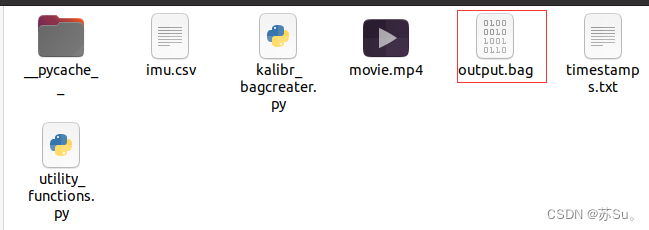
把录制好的bag包放到工作空间目录(catkin_ws)下

三、参数标定
1、安装kalibr
1)安装依赖项
- sudo apt-get install -y \
- git wget autoconf automake nano \
- libeigen3-dev libboost-all-dev libsuitesparse-dev \
- doxygen libopencv-dev \
- libpoco-dev libtbb-dev libblas-dev liblapack-dev libv4l-dev
不同的Ubuntu需要安装不同的内容,我安装的20.04版本
- # Ubuntu 16.04
- sudo apt-get install -y python2.7-dev python-pip python-scipy \
- python-matplotlib ipython python-wxgtk3.0 python-tk python-igraph
- # Ubuntu 18.04
- sudo apt-get install -y python3-dev python-pip python-scipy \
- python-matplotlib ipython python-wxgtk4.0 python-tk python-igraph
- # Ubuntu 20.04
- sudo apt-get install -y python3-dev python3-pip python3-scipy \
- python3-matplotlib ipython3 python3-wxgtk4.0 python3-tk python3-igraph
2)创建工作空间
- mkdir -p ~/kalibr_workspace/src
- cd ~/kalibr_workspace
- source /opt/ros/noetic/setup.bash
- catkin init
- catkin config --extend /opt/ros/noetic
- catkin config --merge-devel
- catkin config --cmake-args -DCMAKE_BUILD_TYPE=Release
问题:catkin:未找到命令
![]()
解决办法:
- sudo apt-get update
- sudo apt-get install python3-catkin-tools
3)下载及编译
- cd src
- git clone https://github.com/ethz-asl/kalibr.git
- cd ..
- catkin build -DCMAKE_BUILD_TYPE=Release
2、相机标定
1)前期准备
在 kalibr_workspace 目录下新建 test1 文件,并放入所需文件
①含有标定板的bag文件
用手机录完并打包生成rosbag文件,命名为cam0.bag
②含有标定板信息的yaml文件,官方给了三种格式,我选择棋盘格(checkerboard)
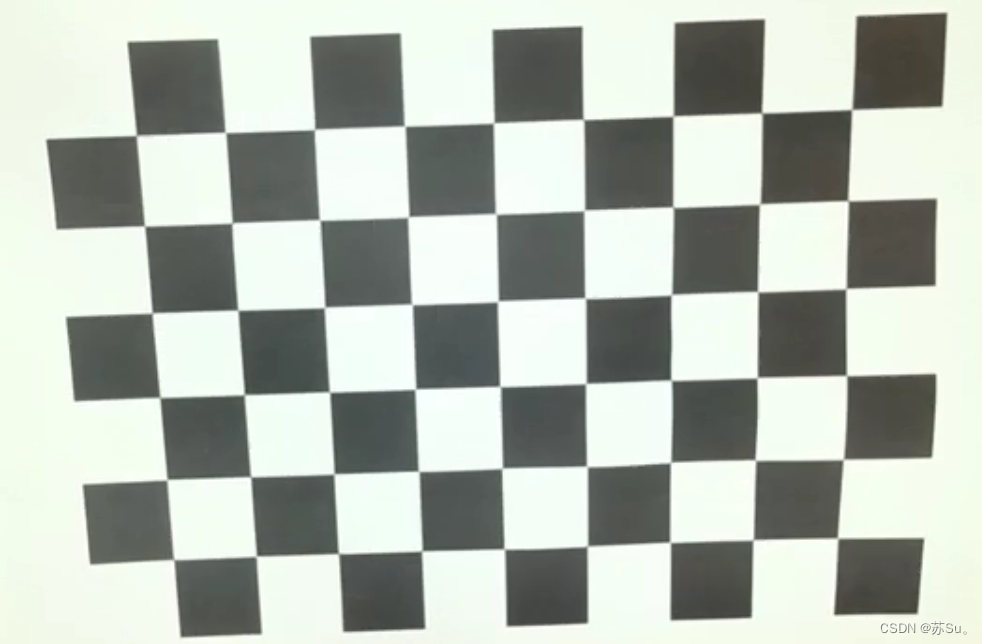
新建 checkerboard.yaml 文件并在其中填入如下内容:
target_type: 'checkerboard' #gridtype
targetCols: 9 #number of internal chessboard corners
targetRows: 6 #number of internal chessboard corners
rowSpacingMeters: 0.025 #size of one chessboard square [m]
colSpacingMeters: 0.025 #size of one chessboard square [m]
保存关闭
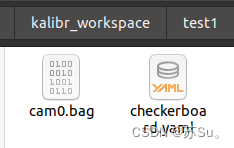
2)标定
- source ~/kalibr_workspace/devel/setup.bash
- kalibr_calibrate_cameras --bag ./cam0.bag --topics /cam0/image_raw --models pinhole-radtan --target checkerboard.yaml
问题:kalibr_calibrate_cameras:未找到命令

解决办法:
打开 kalibr_workspace/devel/lib/kalibr ,将 kalibr_calibrate_cameras 复制到 test1 内
然后输入命令
./kalibr_calibrate_cameras --bag ./cam0.bag --topics /cam0/image_raw --models pinhole-radtan --target checkerboard.yaml成功!

成功后会弹出来一份标定报告(calibration report)

最上面五个界面分别是 估计姿态、极差、方位角误差、重投影误差、异常值误差,并且会以pdf形式在文件夹中显示,同时还会有标定结果的文本形式,相机标定的配置文件
ps:重投影误差越聚集,代表标定情况越好

红框内的是标定结果

3、imu标定
标定是用imu_utils实现的,需要一些依赖文件,所以安装顺序是ceres→code_utils→imu_utils,不能颠倒次序也不能同时安装
1)ceres
之前已经安装过ceres了,所以这里就不多赘述了,具体安装步骤可以参考 我的这篇文章 第五部分内容
2)依赖项
sudo apt-get install libdw-dev3)安装code_utils
- cd ~/catkin_ws/src
- git clone https://github.com/gaowenliang/code_utils
在编译前需要对文件做一点修改
打开 ./code_utils/src/sumpixel_test.cpp (因为之前为了调试安装了vim,所以默认代码都是用vim打开的,这里要手动选择其他打开方式找到文本编辑器)
第二行,将引号里的内容改成 code_utils/backward.hpp ,保存关闭

打开 ./code_utils/CMakeLists.txt
第5行,括号里改成 CMAKE_CXX_STANDARD 14 并在第7行加上 include_directories(include/code_utils) ,保存关闭

- cd ..
- catkin_make
问题:Invoking "make -j1 -l1" failed

解决办法:
换一个编译命令
catkin_make -DCATKIN_WHITELIST_PACKAGES=‘code_utils’成功
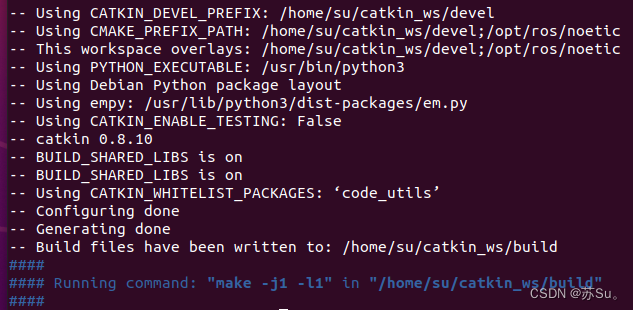
4)安装imu_utils
- cd ~/catkin_ws/src
- git clone https://github.com/gaowenliang/imu_utils
修改一下文件内容
打开 ./imu_utils/CMakeLists.txt
第6行,将括号里的内容改成 CMAKE_CXX_STANDARD 14 ,保存关闭

- cd ..
- catkin_make
5)录制imu标定数据
开启Record,将手机静置至少2h(此时效果比较好,不建议太长或太短,具体时间可以自己决定)
然后把imu数据单独打包
打开 ./kalibr_bagcreater.py
第581行,注释掉,在下一行加上 pass ,保存关闭,这样编译的时候就不会因为没有image提示了

保存关闭,输入打包命令
./kalibr_bagcreater.py --imu imu.csv --output_bag imu.bag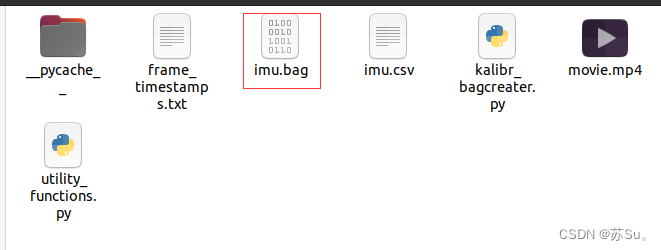
并将其copy到 catkin_ws 目录下
6)更改文件
进入 catkin_ws/src/imu_utils/launch 目录下,新建 android_imu.launch 文件,并填入如下内容
<launch>
<node pkg="imu_utils" type="imu_an" name="imu_an" output="screen">
<param name="imu_topic" type="string" value= "/imu0"/>
<param name="imu_name" type="string" value= "HUAWEI"/>
<param name="data_save_path" type="string" value= "$(find imu_utils)/"/>
<param name="max_time_min" type="int" value= "120"/>
<param name="max_cluster" type="int" value= "100"/>
</node></launch>
data_sava_path 代表输出路径,可以根据自己的情况更改
max_time_min 代表的是录制视频的最长时长,如果超过120min会报错,注意改一下
保存关闭
然后编译一下
catkin_make7)标定
进入 catkin_ws 目录下
- source ~/catkin_ws/devel/setup.bash
- roslaunch imu_utils android_imu.launch
-
- # 新开一个终端
- rosbag play -r 200 output.bag -s 10
问题:RROR: cannot launch node of type [imu_utils/imu_an]: Cannot locate node of type [imu_an] in package [imu_utils]. Make sure file exists in package path and permission is set to executable (chmod +x) (解决方法时灵时不灵)

解决办法:
进入 catkin_ws/src/imu_utils/src 右键单击文件 imu_an.app 打开属性,选择权限,发现是只读,勾选 允许文件作为程序执行
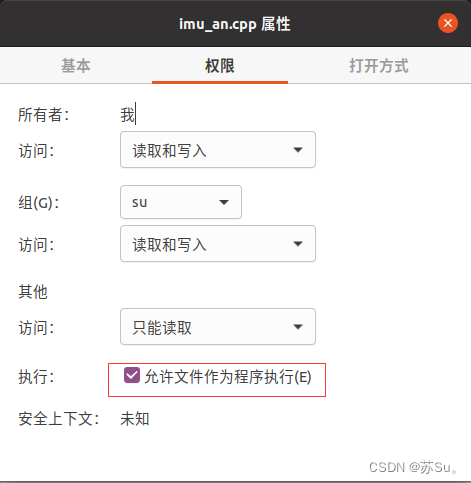
然后继续编译
- source ~/catkin_ws/devel/setup.bash
- roslaunch imu_utils android_imu.launch
标定结果太差,直接用参考数值

四、运行vins
1、修改参数文件
1)yaml文件
进入 /catkin_ws/src/Vins-Mono/config,新建一个名为android的文件夹,然后将euroc下的euroc_config.yaml 复制过来改名为 android_config.yaml
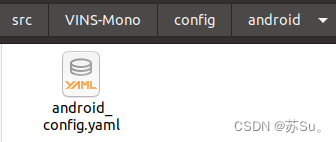
打开然后开始修改
①第6,69行,改成自己的路径


②第11,12行,改分辨率,与之前录制视频的分辨率一致

③第19-22行,改相机内参
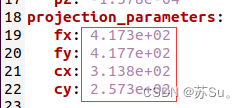
数值是之前标定过的
④第25行,不知道imu外参,改成2(自动修正)

⑤第59-62行imu内参

⑥第72行,在线估计同步时差,改成1

保存关闭
2)launch文件
进入 /catkin_ws/src/Vins-Mono/vins_estimator/launch 对euroc.launch文件复制粘贴并重命名为android.launch

修改一下路径

保存关闭
2、重新编译
- cd ~/catkin_ws
- catkin_make
3、运行
打开第一个终端:
roscore
打开第二个终端:
- source devel/setup.bash
- roslaunch vins_estimator android.launch
打开第三个终端:
- source devel/setup.bash
- roslaunch vins_estimator vins_rviz.launch
打开第四个终端:
- source devel/setup.bash
- rosbag play output.bag
运行成果
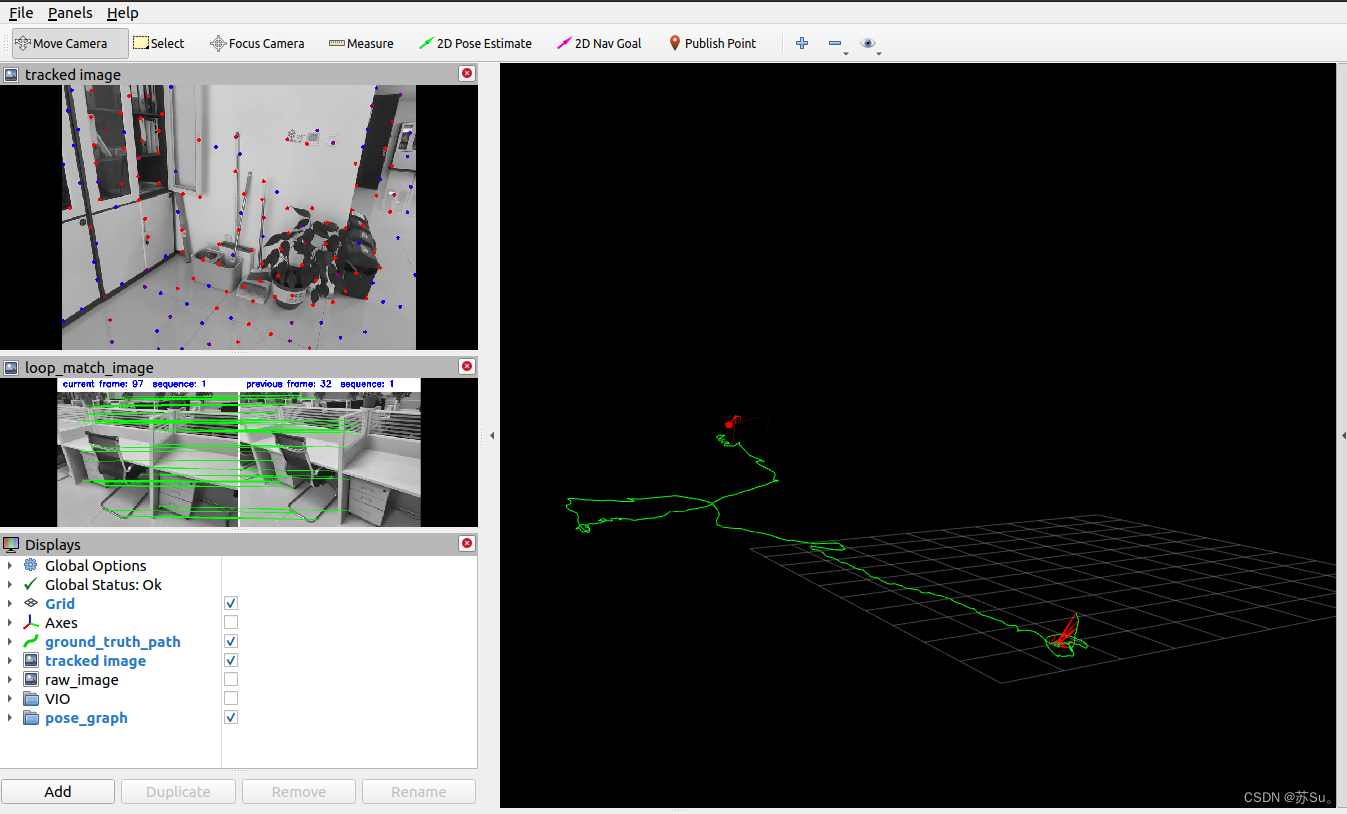
问题:在可视化界面,有影像但是没有轨迹(废弃,手机导致的问题)
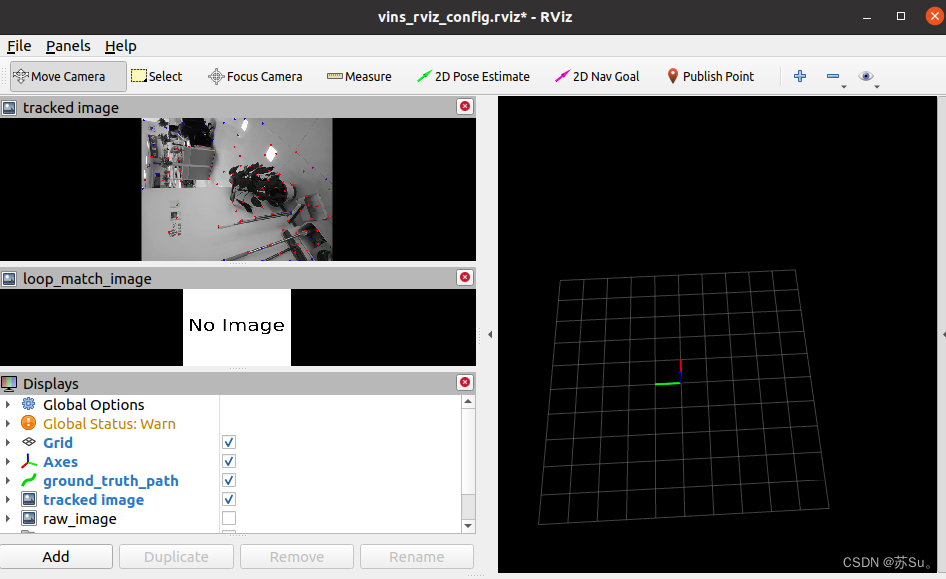
原因:用 rosbag info 命令查一下自己录制的内容(第一个),和官方数据集(第二个)对比一下,发现imu数据没录进去


解决办法:
在数据打包的时候,录两个bag
一个是正常录制的(就是第一次录的那个初始bag),命名为 movie.bag,
再录一个imu的,根据 三.3.6) 改一下文件录制单独的 imu.bag ,运行命令
./kalibr_bagcreater.py --imu imu.csv --output_bag imu.bag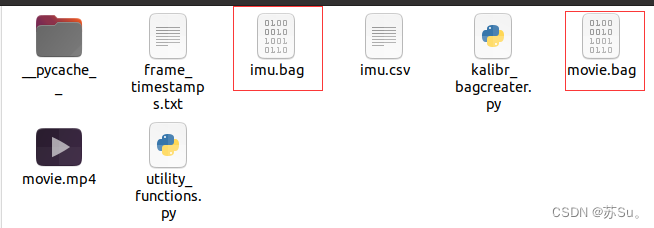
打开一个终端输入:
roscore打开第二个终端输入:
rosbag record -O output.bag /cam0/image_raw /imu0打开第三个终端输入:
rosbag play movie.bag等这个终端播放完毕以后继续输入:
rosbag play imu.bag播放完毕后回到第二个终端结束record
ctrl+shift+C 或 ctrl+C
结束后会发现当前目录下已经出现了 output.bag,这时候再查,就发现有两个topic了
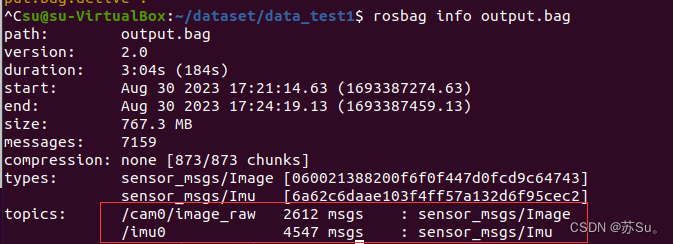
注意两个topic后面的数字是不一样的,imu 要大于 cam 要是差不多那说明你imu数据录错了
试了一下,还是不行,运行时会显示 throw img, only should happen at the beginning
查了一下是初始化的问题,imu第一个数据的时间大于图像第一个数据的时间(图像帧有多余的)
破案了,是我手机没有加速度计,所以读不到完整的imu数据,等有钱了一定要换一个内置imu的手机_(:з」∠)_
五、参考资料
/usr/bin/env: “python3 “: 没有那个文件或目录
解决/usr/bin/env:python:No such file or directory
Ubuntu20.04下vins-mono调用摄像头并跑通(D435i)
【Linux配置五】 Ubuntu18.04+kalibr标定工具箱安装编译
解决ROS中运行launch文件报错ERROR: cannot launch node of type[xxx/xxx]:xxx的问题办法最全汇总


